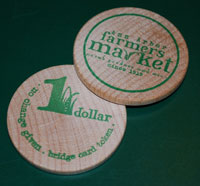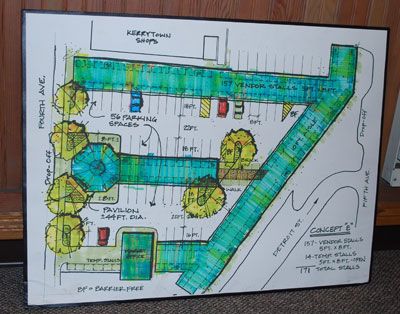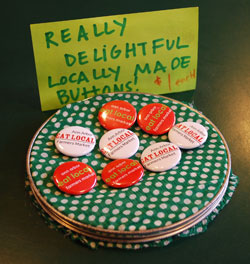Don’t Take Any Wooden Nickels – Oh, Wait…

People that receive federal food aid will soon be able to make purchases at the Ann Arbor Farmers Market, using these wooden tokens.
If you’re getting government aid to put food on the table, you know all about the Electronic Benefits Transfer, known in Michigan as the Bridge Card. You already know that this debit card – which replaced paper food stamps and other assistance – looks pretty much like any other debit or credit card. And you also know you can’t use it at the Ann Arbor Farmers Market.
Yet.
Molly Notarianni, the city’s market manager, has a box of 1,000 wooden tokens and a new system that will allow people to use their Bridge Cards to shop at the market. While some logistics still need to be worked out, Notarianni hopes to launch the program within a month or two.
Here’s how it will work: Shoppers take their Bridge Card to the Farmers Market office and ask for a certain amount in tokens – say, $20. Notarianni will swipe their card, which triggers a transfer of funds from their account into the Farmers Market account. She’ll then give the shopper $20 worth of tokens that they can use with select vendors – each token is worth $1. Those vendors, in turn, will take the tokens back to Notarianni and exchange them for cash or a check (one of those details not yet nailed down). Vendors won’t make change, but they’re usually willing to make up the difference by tossing in a little extra produce, Notarianni says.
It’s not clear how many of the 140 vendors will volunteer to participate. About 35 of them are part of a similar effort called Project Fresh, which provides coupons for fresh fruit and vegetables to those enrolled in the federal Women, Infants and Children (WIC) program. Unlike Project Fresh, which has limits on the types of food you can buy, the tokens could be used for anything a participating vendor sells.
If you’re thinking, “Dag! Those tokens are cool but I don’t use a Bridge Card …” – not to worry. Notarianni plans to offer another version of the token – probably using a different color and denomination – for people who don’t have a Bridge Card. People might buy them as gift tokens, for example. Mainly, they’d be a way to de-stigmatize the tokens in the same way that Bridge Cards did for food stamps. If you ever stood at a grocery checkout and had the person behind you scrutinize your purchases because you were paying with food stamps, you’ll understand.
Now, What About Those Market Renovations?
While The Chronicle was chatting with Notarianni, we couldn’t help but notice a colorful rendering for renovations at the market, which were approved by city council two years ago. So we asked: What’s up with those?
Turns out, not much.
The first phase of the project, which was supposed to start this spring, didn’t. It includes washing and repainting the “sheds” (the structures that cover the aisles), repairing gutters, and installing a PA system and lights. The mayor wanted LED lighting, Notarianni says, which the vendors didn’t like. Instead, they’re planning to use fluorescent lights along the outer sides of the shed’s ceiling, with induction lights installed along the center. The electrical system also will get an upgrade.
Phase 2 deals with storm water management and reconstruction of the center part of the parking lot. The final phase includes building a pavilion – in the rendering, it’s the octagon-shaped structure, but Notarianni says for cost and space reasons it will be square.
No word on when the estimated $1.4 million project will commence. However, an unrelated project – the installation of solar panels – is complete, and put the Farmers Market on the recent Solar Tour.
Hear more about the market’s plans on Oct. 8, when Notarianni will be the guest on “Conversations,” a CTN interview show. It airs at 6:30 p.m. on CitiTV Channel 19 and is rebroadcast Monday through Friday at 10:30 a.m., 6:30 p.m. and 10:30 p.m., and Sundays at 6:30 p.m.







I would totally buy a slew of these. We want to set a weekly budget of money to spend at Farmer’s Market and these would be great for that. Buy a mess of tokens, put however many in an envelope for each week and then spend them. Wonderful – it would help remove the temptation to spend the money elsewhere.